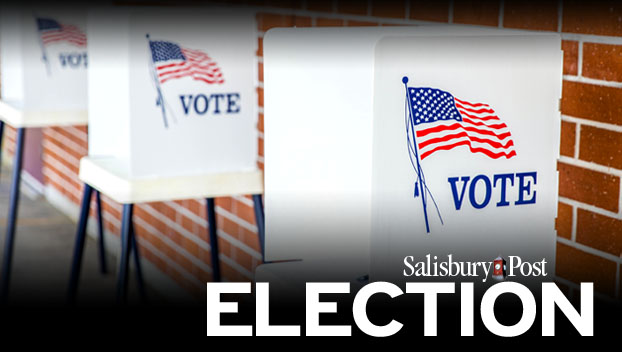Election 2020: Cooper says state must base future decisions on science; Forest wants full reopening of economy
Published 12:00 am Tuesday, October 13, 2020
By Natalie Anderson
natalie.anderson@salisburypost.com
SALISBURY — While Gov. Roy Cooper, a Democrat, cites a record of progress for the state, he believes there’s more to be done, which will include basing future decisions on science and data. Republican Lt. Gov. Dan Forest, if elected governor, wants to completely reopen the economy and focus on getting people back to work.
Cooper and Forest are vying for the governorship of North Carolina, which entails overseeing the state budget, signing bills into law and managing the executive branch.
Cooper previously served in the state House, state Senate and as the state’s attorney general.
Forest, a Republican, is serving his second term as the state’s lieutenant governor. Before that, Forest worked as an architect and served as an office president and senior partner at Little Diversified Architectural Consulting, the largest architectural firm in North Carolina.
Both candidates responded to questions sent by the Salisbury Post.
Cooper said he wants to continue building on his mission, which is to have a state where “people are better educated, healthier and have more money in their pockets so that there will be more opportunities for people to have lives of purpose and abundance.”
But before the economy can fully recover, Cooper said the pandemic has to be dealt with first. That includes sticking with science and leaders who take the virus seriously. And his decisions regarding the pandemic response, he said, have been ones based on science and data.
He credited North Carolinians with slowing of the spread of the virus, and said he and other state leaders have helped the unemployed, schools, teachers and small businesses. He referenced his executive orders prohibiting utility shutoffs as well as providing additional funds for small businesses across the state.
“We have taken a dimmer switch approach to all decisions,” Cooper said. “These decisions aren’t easy, but by making them, we’ve been able to work to stabilize the virus. I am committed to getting us through this pandemic, as well as rebuilding North Carolina even stronger than before.”
Forest said the top three issues to prioritize for the state includes creating jobs, putting students first and protecting law and order. Forest supports fully reopening the economy as well as protecting students’ school choice options.
“So many of society’s ills can be cured by a good job,” Forest said. “We need to make sure that all parts of our state have the infrastructure needed to land job opportunities and that people have the training and skills needed to fill them.”
But Forest notes the government’s first priority should be the security of people, which entails keeping “violent criminals off our streets and behind bars where they belong.”
He added that not reopening the economy will create far greater harm than what COVID-19 has done, adding that state leaders can protect the vulnerable and get healthy people back to work simultaneously.
Forest also said, if elected, his administration would be more transparent about COVID-19 data by including more information on recoveries as well as reports of suicide, domestic violence, drug overdoses and child abuse.
Currently, state health officials provide an updated number of presumed recoveries across the state each Monday on its website.
Cooper has advocated for the expansion of Medicaid during his time as governor, and notes the pandemic has highlighted the urgent need to expand that coverage to thousands of North Carolinians. He asked lawmakers in September to expand the program in the state’s budget, but it ultimately wasn’t included.
North Carolina is currently one of 12 states that hasn’t expanded the Medicaid program. Cooper noted that one of the 39 red and blue states that did pass it includes Indiana, when Vice President Mike Pence was governor.
“Though legislative leaders and my opponent continue to stand in the way, I’m fighting to expand Medicaid to close that coverage gap and extend coverage to at least half a million people, including families and veterans, at no additional cost to the state,” Cooper said, adding that expansion would boost the economy by $4 billion and create 40,000 jobs.
Forest said he supports high-quality, affordable health care, but that Medicaid expansion “does not fit the bill.” Instead, he proposes recruiting health care workers to rural communities, working with lawmakers and the state treasurer to ensure more drug costs transparency and fighting to get those without coverage on private insurance.
“But right now, the quickest way to get people health insurance is to help them find a job,” he said.
While Forest acknowledged racism is real, he said social and racial equity begins with the right to life, adding that abortions have had a disproportionate impact on the African-American community.
Cooper said the death of George Floyd — a Black man who is shown in a viral video dying when a Minneapolis police officer pressed his knee into Floyd’s neck for several minutes until Floyd stopped breathing — and other Black lives broke open painful wounds. And as a result, North Carolinians have to listen to the people lifting up their voices for equality, and continue pushing for justice and solutions.
“We have to have those hard conversations, and then make sure those translate to real action to fight racism and build safer communities,” Cooper said.
Governors have the ability to form task forces to address specific issues, such as race. Cooper referenced the North Carolina Task Force for Racial Equity in Criminal Justice, which he established in June to recommend solutions to stop discriminatory law enforcement and criminal justice practices, while also holding public safety officers accountable. He added that the task force has already made recommendations to ban choke holds and install a duty for officers to intervene in excessive force or abuse cases.
Cooper served as Attorney General for 16 years before being elected as governor in 2016. During that time, he worked hard to fight violent crime and protect people, he said.
“We have to make sure that we invest to attract and retain the best law enforcement officers that we can and make sure they reflect the communities they serve with more diversity,” he said. “We also need better training of law enforcement on de-escalation and bias training.”
Forest credits himself with working with and building trust with the General Assembly, as well as supporting bipartisan legislation. Some of that legislation includes the “Restore Campus Free Speech Act” passed in 2017 and the Small Business Healthcare Act, which allows for more association health care plans from the private sector for small businesses.
When asked to compliment their opponent, Cooper said he believes Forest values his faith and family the way Cooper does. Forest said they both have families and bring that perspective to governing.
“I will continue to make decisions based on science and data to put the health and safety of North Carolinians first,” Cooper said. “This moment demands measured and strong leaders who can hear everybody and who can be peacemakers in this state and this country because we need healing. I’ve done my best to be that leader and will continue those efforts in my next term.”
Forest said North Carolinians can be brought together through the shared values of hard work, family and patriotism.
“The next few years will be critical for our state. As we rebuild our economy, we can’t leave any neighborhood behind — urban, rural or anywhere in between,” Forest said. “That’s why I’m running for governor.
Contact reporter Natalie Anderson at 704-797-4246.





